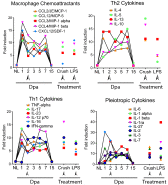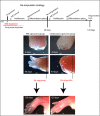Macrophages are required for adult salamander limb regeneration
- PMID: 23690624
- PMCID: PMC3677454
- DOI: 10.1073/pnas.1300290110
Macrophages are required for adult salamander limb regeneration
Abstract
The failure to replace damaged body parts in adult mammals results from a muted growth response and fibrotic scarring. Although infiltrating immune cells play a major role in determining the variable outcome of mammalian wound repair, little is known about the modulation of immune cell signaling in efficiently regenerating species such as the salamander, which can regrow complete body structures as adults. Here we present a comprehensive analysis of immune signaling during limb regeneration in axolotl, an aquatic salamander, and reveal a temporally defined requirement for macrophage infiltration in the regenerative process. Although many features of mammalian cytokine/chemokine signaling are retained in the axolotl, they are more dynamically deployed, with simultaneous induction of inflammatory and anti-inflammatory markers within the first 24 h after limb amputation. Systemic macrophage depletion during this period resulted in wound closure but permanent failure of limb regeneration, associated with extensive fibrosis and disregulation of extracellular matrix component gene expression. Full limb regenerative capacity of failed stumps was restored by reamputation once endogenous macrophage populations had been replenished. Promotion of a regeneration-permissive environment by identification of macrophage-derived therapeutic molecules may therefore aid in the regeneration of damaged body parts in adult mammals.
Keywords: developmental biology; immunology; limb development; wound healing.
Conflict of interest statement
The authors declare no conflict of interest.
Figures






References
-
- Carlson BM. Principles of Regenerative Biology. New York: Elsevier/Academic Press; 2007. p. xix.
-
- Brockes JP, Kumar A. Appendage regeneration in adult vertebrates and implications for regenerative medicine. Science. 2005;310(5756):1919–1923. - PubMed
-
- Brockes JP, Kumar A. Plasticity and reprogramming of differentiated cells in amphibian regeneration. Nat Rev Mol Cell Biol. 2002;3(8):566–574. - PubMed
-
- Parish CL, Beljajeva A, Arenas E, Simon A. Midbrain dopaminergic neurogenesis and behavioural recovery in a salamander lesion-induced regeneration model. Development. 2007;134(15):2881–2887. - PubMed
-
- Ferretti P, Zhang F, O’Neill P. Changes in spinal cord regenerative ability through phylogenesis and development: Lessons to be learnt. Dev Dyn. 2003;226(2):245–256. - PubMed
Publication types
MeSH terms
Substances
LinkOut - more resources
Full Text Sources
Other Literature Sources

